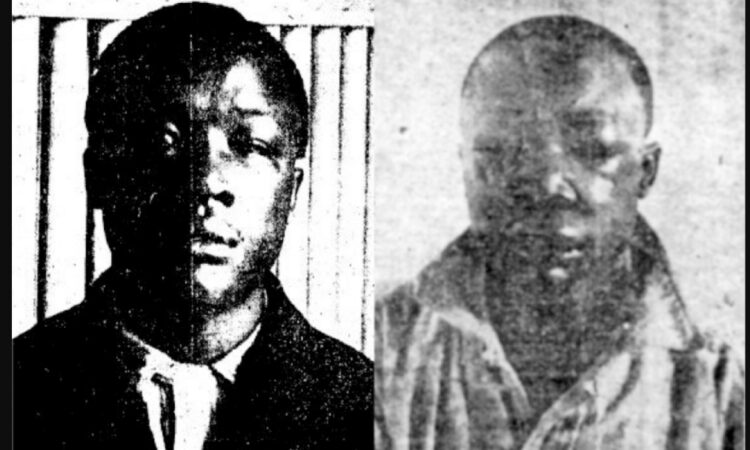A Forgotten History: A Dead White Man, A Raging Mob and A Black Teen Caught In the Middle. Lawyers Seek Posthumous Pardon for Man Whose Arrest Partially Prompted the 1908 Race Riots In Illinois.

A group of legal minds is hoping to have the man, whose prolonged trial and execution was the catalyst for the Illinois 1908 race riot, pardoned for an unfair conviction. The lawyers submit the jury was racially prejudiced, and thus did not give the man a fair trial.
The Center on Wrongful Convictions and Northeastern University School of Law’s Civil Rights and Restorative Justice Project in Boston have filed a petition for executive clemency on behalf of Joe James, an early 20th-century Black man convicted by a racially charged white jury, according to the Associated Press.
Police arrested James, who was 19 years old at the time, as he was sleeping under a tree in Springfield, Illinois on July 4, 1908. James was accused of beating up a white mine engineer named Clergy Ballard, who later died from his injuries.
Ballard’s daughter Blanche, 16, said a strange man broke into their home, attempted to lure her out of her bed with the intention of raping her, and fought her father. During the fight, the strange man cut and stabbed her father until he was almost dead.
Researcher Carole Merrit reported in her piece “Something So Horrible: The Springfield Race Riot of 1908” for President Abraham Lincoln’s official library challenged the account, asking how a deadly fight broke out and not awaken her two brothers who were in the home or any of the neighbors.
The next day, James was found sleeping a few blocks from the Ballard home. He was recovering from a long night of drinking, gambling and playing piano at a couple of saloons and brothels in the Black district of the city called Levee.
According to the Restorative Justice Project, James, originally from Alabama, was a traveling pianist who came to the area for work and had the intention to continue to play throughout the Midwest.
New to the city, he wandered into the North End, an area for whites, and fell asleep. Four white girls noticed the Black person in the community and went and told others.
Somehow the strange man from the house and James, a stranger in the neighborhood, were conflated.
Ballard’s sons and some neighbors first confronted James, beating him “severely.” His eyes were reportedly swollen shut, his lips split open and he was bleeding from one of his ears and his nose.
Officers came and saw him and arrested him for allegedly beating up Ballard. James, however, had no clue why he was detained.
“I was so drunk I don’t know where I was or what I did,” he said.
Clergy Ballard died on the morning of his arrest, and the assault crime escalated to murder.
The headlines in the newspapers, which incited the white mob already angry about another allegation of a Black man raping a white woman, painted “Ballard was the chivalrous White man who was called upon to protect the purity of his daughter from the lust and brutality of a Black intruder.”
Before James could be tried and later executed, a white mob sought to get justice on their own terms. They displaced the punishment they thought James should have received immediately onto the Black people in the community.
The mob burned down buildings and terrorized African-Americans in the area, mostly because the law was taking too long to convict James and another Black man of crimes against white women— and Ballard’s murder.
Months later, on Oct. 23, 1908, James was hanged outside of the Sangamon County jail. Also, the hundreds of white people arrested for rioting and terrorizing Black people (which included lynching), were acquitted and set free.
“Throughout history, we have seen white juries not only convict and execute Black men and women on scant evidence but acquit whites who murder Black people in the face of overwhelming evidence of guilt,” said Margaret Burnham, founding director of Northeastern’s Civil Rights and Restorative Justice Project.
“This double standard operated in Springfield in 1908,” she added, infecting Springfield’s criminal justice system and depriving James of a fair trial.”
The lawyers pushing for James’ pardon are not saying he did or did not do the crime. They are saying he did not get a fair trial.
“James’ factual innocence is not the focus of this petition, because the passage of time and the destruction of evidence have made it impossible to prove conclusively that James was innocent,” said Steve Drizin, co-director of Northwestern University’s Pritzker School of Law’s Center on Wrongful Convictions.
Their pardon petition is scheduled to be reviewed in April 2023. Should the board accept the petition, they would recommend Gov. J.B. Pritzker to posthumously pardon the man 115 years after his conviction.
This would make James’ pardon the third of its kind in the state of Illinois in the last decade.




